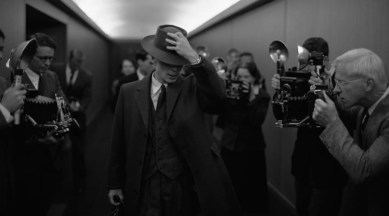Click here to follow Screen Digital on YouTube and stay updated with the latest from the world of cinema.

Christopher Nolan’s Oppenheimer isn’t just about the chain reaction that is set off when a neutron hits the nucleus of an atom. It’s more about the chain reaction every time great power falls into great hands.
Nolan isn’t seeking to impress in Oppenheimer with his latest foray into high-concept science, not going too much into the difference between fusion and fission, uranium and plutonium, and the relative advantages of one over the other. Instead, his gaze is directed almost at all times into the makings of the inner universe of the man who would be the father of the atom bomb.
Nolan’s film runs in three parallel storylines. In one, Oppenheimer grows from a budding physicist and one of the pioneers of quantum mechanics in America, to the prominent name he would become, being chosen to lead the top-secret Manhattan Project to make the world’s first atom bomb. In another, with the Second World War barely a decade in the past, he finds himself grilled by a small, aggressive panel on whether he was actually sabotaging America’s security interests due to his once Communist sympathies. In a third, he is being put on trial at a Senate hearing via the questioning of the head of the Atomic Energy Commission (played by Robert Downey Jr), who is hoping to be confirmed as a minister, not caring what he has to say about Oppenheimer’s loyalty to America.
It’s a film as much about our times as about the post-World War II era when America was seeking enemies in every shadow. How many times and how many ways does a person need to prove oneself when dragged into those shadows? What are the questions one is allowed to raise before one crosses the line in the name of “national security”? What personal costs does a country demand of you? As wars drag on even now, “despite the bomb that was to end all bombs”, and underneath nuclear shadows still, Oppenheimer is prophetic when he says in the film that he didn’t regret making the atom bomb and potentially ending WWII, but that this set in when he realised that humans would not stop at using anything to make a weapon.
If those are the bigger questions Nolan’s film raises, it’s also a deep personal look at Oppenheimer himself. Not a particularly religious Jew, Oppenheimer finds himself having to convince his countrymen amidst Hitler’s rise that the Nazis are a greater threat than Communism. He must do this while not being seen to overdo his sympathy for either fellow Jews or communists. He loves, he loses, he idolises, he seeks out glory, and he forges ahead and makes a name for himself in a field that is first lonely and then almost too crowded as news gets around of Germans racing ahead in the nuclear game.
The Los Alamos lab he sets up is framed by Nolan as one of those towns in the Old West, where instead of men on horses, equipment on trucks passes down dusty lanes, and scientists have heated arguments not with guns but over the moralities of a bomb whose destructive power no one is really sure of. Can it set the atmosphere on fire is one possibility they must consider. Can the use of a nuclear bomb be justified when Hitler has already surrendered and Japan is about to, is another moral hiccup they must swallow. Closer and closer to the bomb, Oppenheimer finds himself ready to brush those qualms away – even the confession by the US Secretary of State that there is actually no facility big enough to be identified as a specific target in Japan, and hence they must just pick a town to set an example.
Was Oppenheimer’s resistance to a hydrogen bomb later, and consistent appeals to end the arms race a convenient salve for the guilt he bore? That is for the world to judge, though it is clear that the question is eating him up from within – as Murphy almost painfully depicts.
This is almost an entirely Murphy show, with a lot of great actors pitching in for important parts. Nolan takes his time kicking the proceedings into action, and in her bit role, Florence Pugh is the most impactful.
As he watches the world go up in balls of fire in New Mexico desert when they first test the atom bomb, as flames and smoke billow out and the shock waves hit, as the powers of the universe are actually harnessed from the tiniest of its beings, as the world we know it is upturned, and Oppenheimer/Murphy whispers those words — “Now I am Death, the Destoyer of Worlds” — you can for a moment feel the presence, and absence, of God.
Oppenheimer movie cast: Cillian Murphy, Emily Blunt, Matt Damon, Florence Pugh, Rami Malek, Kenneth Branagh, Gary Oldman and Robert Downey Jr.
Oppenheimer movie director: Christopher Nolan
Oppenheimer movie rating: 4.5 stars
Click here to follow Screen Digital on YouTube and stay updated with the latest from the world of cinema.